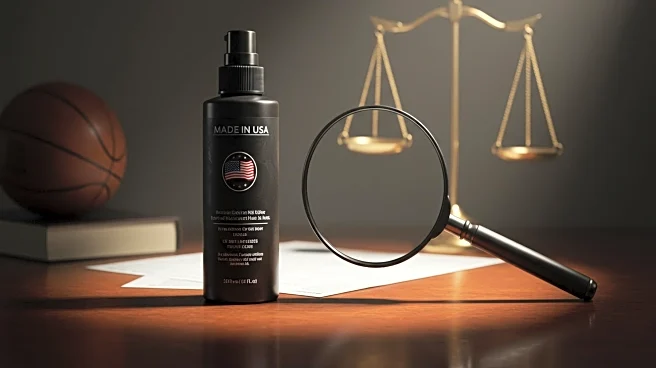What's Happening?
A lawsuit in California is challenging the 'Made in USA' marketing claims of a luxury haircare brand, It's a New 10, due to the inclusion of key ingredients sourced from overseas. Judge Gonzalo P. Curiel of the U.S. District Court for the Southern District of California has allowed part of the case to proceed, granting in part and denying in part the company's motion to dismiss. The plaintiff, Maria Corona, alleges deceptive labeling under state law, claiming that the product she purchased contained foreign ingredients such as palm oil and silk amino acids. The case involves the interplay between the Federal Trade Commission's 'Made in USA' rule and California's statute, which differ in their requirements for foreign content. The court found that the complaint sufficiently alleged a violation of California's baseline rule but dismissed certain claims for failing to show that foreign content exceeded statutory thresholds.
Why It's Important?
This case underscores the complexities brands face when making 'Made in USA' claims, highlighting the differences between federal and state standards. The outcome could impact how companies label their products, potentially leading to stricter compliance with both FTC and California regulations. For consumers, the case emphasizes the importance of transparency in product labeling, ensuring that claims about domestic manufacturing are accurate. The decision also illustrates the legal challenges in proving deceptive practices, requiring plaintiffs to demonstrate not just the presence of foreign components but their proportion relative to the product's overall value.
What's Next?
The court has granted the plaintiff 21 days to amend her complaint to include more specific allegations regarding the value of foreign content. This amendment could determine whether the case proceeds further and potentially influences other similar lawsuits. Brands may need to reassess their labeling practices to avoid legal challenges, considering both federal and state requirements. The case could prompt legislative discussions on harmonizing standards for 'Made in USA' claims, balancing consumer protection with business interests.
Beyond the Headlines
The case raises broader questions about consumer rights and corporate accountability in advertising. It highlights the ethical considerations in marketing practices, where misleading claims can erode consumer trust. The legal distinction between federal and state standards may lead to calls for clearer guidelines, ensuring that consumers are not misled by ambiguous labeling. This could also influence cultural perceptions of domestic manufacturing, affecting consumer choices and brand reputations.










